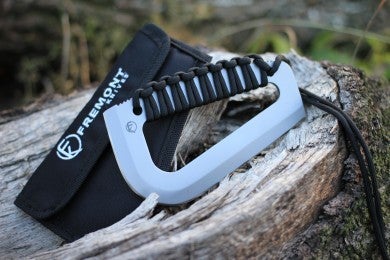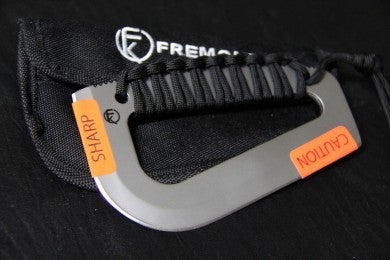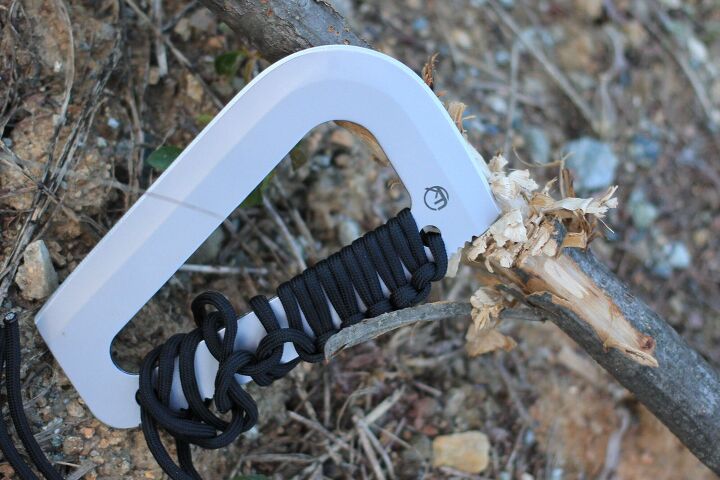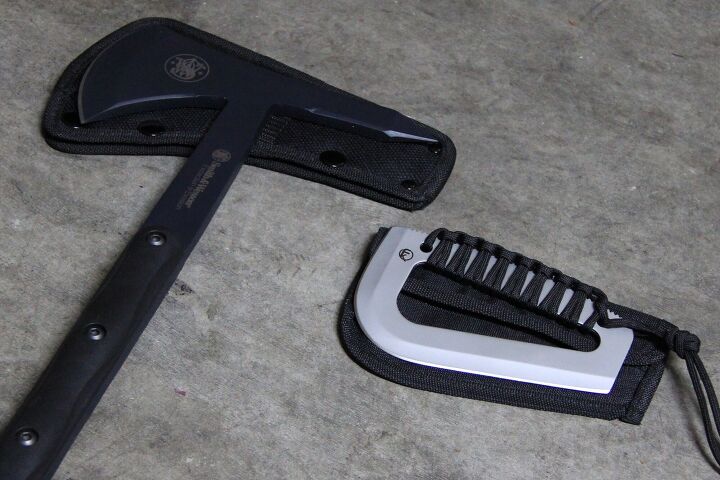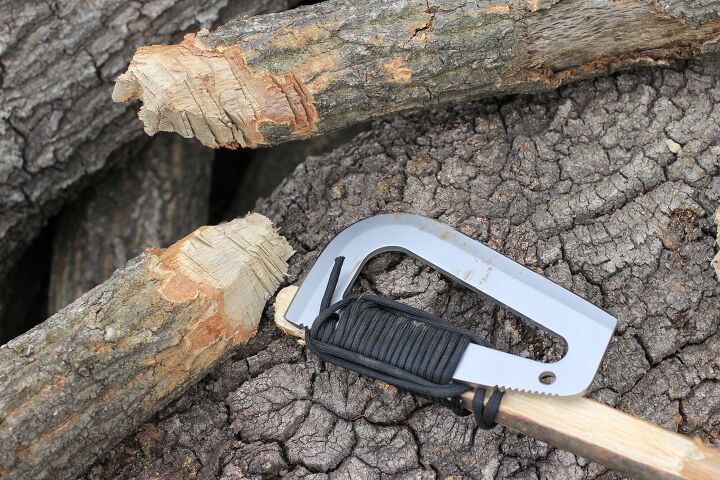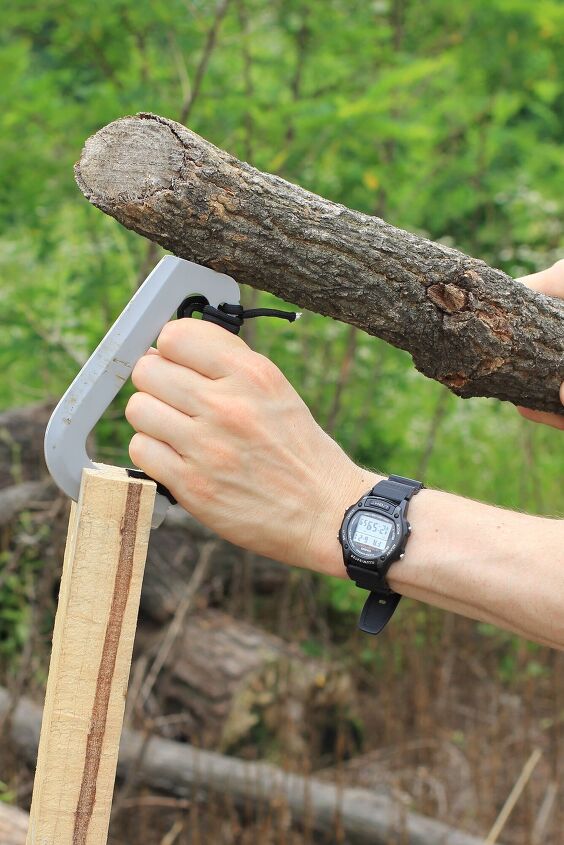Fremont Knives “Farson” Survival tool
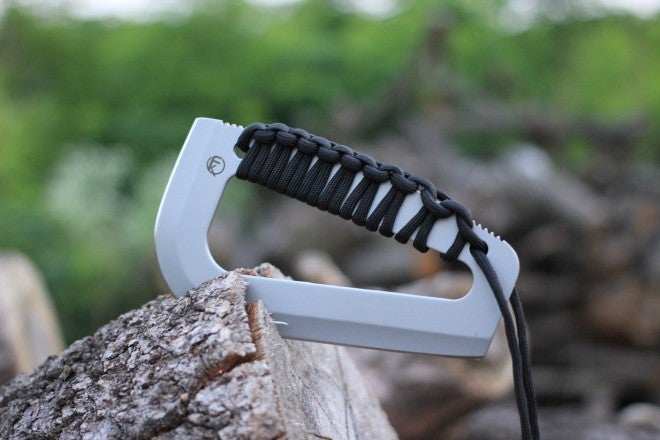
interesting video
Here is an interesting blade that you’ve never thought of owning. The Fremont Knives “Farson” Blade. An interesting modern day take on a prehistoric design which was found in the Great Red Desert in Wyoming. This tool was intended to accomodate a variety of tasks such as chopping, cutting, slicing, and skinning. I took it through a bit of field testing to see if it could hold up to it’s claims.
The factory specs on the blade are as follows…
SPECIFICATIONS:
• Overall Length: 6″
• Blade Length: 3.28″
• Blade Material: Stainless
• Handle : 8ft of Survival Cord
• Nylon Sheath Included
SPECIFICATIONS:
• Overall Length: 6″
• Blade Length: 3.28″
• Blade Material: Stainless
• Handle : 8ft of Survival Cord
• Nylon Sheath Included
The blade comes with several warning labels to announce where the sharpened edge of the blade begins and ends. This is clearly intended for military types like me. The finish is a dull satin except for the cutting edge.
There are two holes drilled in the handle to secure the eight foot paracord which is wrapped in a very deliberate manner. There is also a large stamped out hole in the center to allow a hand to wrap around the handle much like a set of brass knuckles.
The nylon sheath is adequate for storage in a bag or something, but if carried on your person, a kydex rig or leather setup along the cutting edge would work better.
The edge is sharp enough to go to work right away, but not razor sharp. This may be an intentional move by Fremont Knives due to safety concerns and sheath design. A better edge could be achieved by a competent user with a sharpening stone.
I started asking myself what a guy like me could do with this particular blade. The design is so unique I felt like I should attend a class on how to use it properly.
Then again, although it is unique, it is brilliantly simple. You can intuitively scrape and shave bark, create kindling sticks, cut carrots, split timber, process a large animal, create a hatchet, and the list goes on.
Then again, although it is unique, it is brilliantly simple. You can intuitively scrape and shave bark, create kindling sticks, cut carrots, split timber, process a large animal, create a hatchet, and the list goes on.
This could make an excellent addition to any survival kit or bug out pack because it can do so many things whilst taking up very little space/weight. I love the “tacticool” survival tomahawks by Benchmade, S&W, SOG etc etc, but they can be pricey, hefty and ackwardly shaped for a bugout survival kit. With a street price of $50-60 USD, you won’t feel bad about tossing one of these in your pack.
One of the most interesting things about this design is that you can Lash it to a stick to make a chopping tool or hatchet. There is a two foot lanyard which comes off the bottom of the handle with two overhand knots in it. If you untie the top knot you can loosen the cordwrap without untieing the cordwrap. You could then slip a stick between blade and cord to create an ax handle, or a section of stick to act as a palm swell for better grip.
This is a thoughtful cordwrap design, but in practice it doesn’t work very well. After three or four chops the wrap will inevitably come loose despite your best efforts to secure it.
The good news is, if you just unwrap the eight foot cord and create a lashing, it holds like a champ. The file work near the top and bottom of the handle bite into the cord well without damaging it.
The good news is, if you just unwrap the eight foot cord and create a lashing, it holds like a champ. The file work near the top and bottom of the handle bite into the cord well without damaging it.
I tested the field expedient hatchet on the branch pictured. I was impressed at it’s ability, despite the hasty lashing.
I also used a large stick to hammer the bottom of the blade to split a piece of firewood. Once again the blade came through on the task. Fremont knives does not reccomend hammering the blade with stone or metal when performing the tasks mentioned above. It makes sense, but then again you have to wonder what metal is used for the blade exactly. The only description is “high quality stainless steel.” A bold assertion if you ask me. Knife nuts would much rather see a designation such as 440C, AUS 8, ATS 34 etc etc… Just come clean with it Fremont.
I regret that I didn’t have a downed Caribou to test The Farson’s skinning ability. However, based on similarly designed knives by custom makers that I have tested, it would seem the design is capable of such duties.
If you are stepping up your preparedness or looking for a versitile camping/hunting tool for your kit, this may be a feasable option for you.

